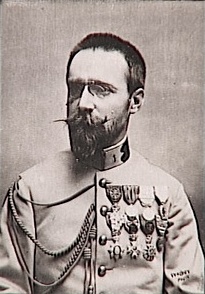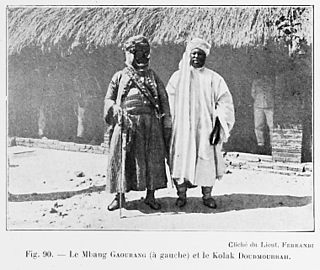
The Sultanate or Kingdom of Bagirmi or Baghermi was an Islamic sultanate southeast of Lake Chad in central Africa. It was founded in either 1480 or 1522 and lasted until 1897, when it became a French protectorate. Its capital was Massenya, north of the Chari River and close to the border to modern Cameroon. The kings wore the title Mbang.

Kousséri, founded and known as Mser in the indigenous Mser language, is a city in Far North Province, Cameroon. It is the capital of the Logone-et-Chari department. It is a market town, and its population has recently been swollen by refugees from Chad. It had a population of 89,123 at the 2005 Census. The majority of the population are Shuwa Arabs with Chadian Arabic used as the lingua franca.
Baguirmi is a department of Chad, one of three in the Chari-Baguirmi Region. It takes its name from the kingdom of Baguirmi. Its capital is Massenya.

Chad was a part of the French colonial empire from 1900 to 1960. Colonial rule under the French began in 1900 when the Military Territory of Chad was established. From 1905, Chad was linked to the federation of French colonial possessions in Middle Africa, known from 1910 under the name of French Equatorial Africa. Chad passed in 1920 to French civilian administration, but suffered from chronic neglect.

Rabih az-Zubayr ibn Fadl Allah or Rabih Fadlallah, usually known as Rabah in French, was a Sudanese warlord and slave trader who established a powerful empire east of Lake Chad, in today's Chad.

The battle of Kousséri originated in French plans to occupy the Chari-Baguirmi region. In 1899–1900, the French organized three armed columns, one proceeding north from Congo, one east from Niger and another south from Algeria. The objective was to link all French possessions in Western Africa, and this was achieved April 21, 1900 on the right bank of the Chari in what is now Chad opposite Kousséri, in what today is northern Cameroon.

The administrative divisions of Chad have often changed since 1900, when the territory was first created by France as part of its colonial empire, with the name Territoire Militaire des pays et protectorats du Tchad. The first subdivision took place in 1910, when 9 circumscriptions were made, named départements (departments) in 1935 and régions (regions) in 1947. As for the regions, they were further divided in districts.

On October 10, 1898, a French military expedition commanded by the Lieutenant de vaisseau Henri Bretonnet and the Lt. Solomon Braun left France directed to Chad, at the time dominated by the Muslim warlord Rabih az-Zubayr. With the missions were the envoys of the Muslim rulers Mohammed al-Senoussi and Abd ar Rahman Gwaranga, sultan of Baguirmi, whom captain Émile Gentil had brought to France a few months earlier.
Solomon Braun (1868–1899) was a French lieutenant of artillery, born at Paris in 1868 and died in Togbao, Chad, in 1899. His father, a poor peddler, observing Solomon's capacity for learning, made the greatest sacrifices to give him a good education. Solomon successfully passed the competitive examination for the École Polytechnique, whence he graduated as lieutenant of artillery. In 1897 he obtained permission from the Minister of War to join the perilous expedition for the exploration of Lake Chad under Lieutenant Henri Bretonnet. The expedition was surprised by the forces of Rabih az-Zubayr, ruler of the region, and almost every member of the mission was killed, Solomon included.

The battle of Kouno was an inconclusive battle that took place between French troops and the Muslim army led by Rabih az-Zubayr, in the context of French colonial expansion in Africa, and more precisely in Chad.

The Voulet–Chanoine Mission, also called Central African-Chad Mission, was a French military expedition sent out from Senegal in 1898 to conquer the Chad Basin and unify all French territories in West Africa. This expedition operated jointly with two other expeditions, the Foureau–Lamy and Gentil missions, which advanced from Algeria and Middle Congo respectively. The refusal of the expedition commander and his second-in-command to follow orders from France, their murder of a commanding officer and their subsequent deaths at the hands of their own soldiers cast a dark shadow over France's emerging colonial empire in Africa at the end of the 19th century. The expedition is remembered for its descent into depravity and extreme violence, actions which today would legally be considered war crimes.

Amédée-François Lamy was a French military officer. He was born at Mougins, in the French département of Alpes-Maritimes on 7 February 1858 and died in the battle of Kousséri on 22 April 1900 as a French explorer officer.

Paul-Jules Joalland was a French officer, known mainly for completing the Voulet–Chanoine Mission.

Henri-Etienne Bretonnet was a French naval officer, killed with most of his men in the battle of Togbao.
Events from the year 1899 in France.

Shehu Umar Sanda ibn Ibrahim Kura al-Kanemi was the Shehu of Borno from 1922 to 1937. He was the son of Shehu Ibrahim Kura of Borno and brother of Shehu Abubakar Garbai.
Makary is a town in Logone-et-Chari, Far North Region, Cameroon, West Africa. The town is located on the right (east) bank of a distributary of the Chari River in the delta just before it enters Lake Chad. The people are known as Kotoko, and the local language is Mpade, Fulani (Fulfulde) is the trade language. The primary economic activity was and is fishing.

Jean Jacques Marie Ferdinand de Béhagle was a French explorer of Africa. He served with the colonial service in Algeria and travelled in the Congo and Ubangi region. While attempting to find a viable land route from the Congo to the Mediterranean via Chad he was taken prisoner by Rabih az-Zubayr and hanged.

Abd ar-Rahman Gaourang II was Mbang of Bagirmi from 1885 to 1918. He came to power at a time when the sultanate was in terminal decline, subject to both Wadai and Bornu. The Sudanese warlord Rabih az-Zubayr made him his vassal in 1893. Gaourang signed a treaty that made his sultanate a French protectorate in 1897. After the final defeat of Rabih in 1900 he ruled as a subordinate of the French in Chad until his death in 1918.


















